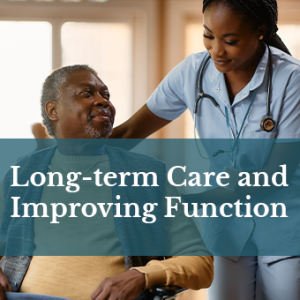
How might innovations in Long-Term Care enable older persons to live with purpose, fulfillment, and dignity?
Presenter(s):
Allison B. Sekuler; James Mayer; Adi Rittenberg, Centre for Aging + Brain Health Innovation and Baycrest Academy for Research and Education, Canada
Abstract
Aligned with the World Health Organization’s (WHO) Long-Term Care Framework and Integrated Care for Older People (ICOPE), this workshop will address the critical role of innovation in long-term care (LTC) systems to enhance the functional ability and quality of life for older persons, so they can live with purpose, fulfillment, and dignity.
Presented by speakers from the Baycrest Academy for Research and Education and the Centre for Aging + Brain Health Innovation, this workshop will highlight emerging trends and promising products, programs, and services that can be used in LTC settings and prioritize individual preferences, promote autonomy and social engagement, and improve the overall well-being of older persons and individuals with capacity challenges. Participants will also learn about innovations that support LTC workforce development, service delivery, and enhance the capacity and competence of the workforce to provide person-centered care.
This workshop will then engage participants in an interactive learning experience featuring case studies, real-world implementation examples, and practical tools from CABHI’s Discover + Adopt (D+A) and Mentorship, Capital, and Continuation Program (MC2). Both of these programs support healthcare organizations and innovators so they can introduce, implement, and sustain innovations. Delegates will be guided through key phases of the innovation implementation journey, including identifying pain points, selecting innovations, preparing for implementation, addressing implementation challenges, monitoring outcomes, and planning for sustainability. The session will close with a discussion of how participants can apply these insights to their own settings, with an emphasis on building capacity for future innovation.
Workshop Objectives:
1. Discover promising innovations that can be implemented in LTCs to improve operational excellence, workforce development, person-centered care, resident satisfaction, and the overall functional ability of older persons.
2. Understand the critical components of successful innovation implementation in LTC settings and common barriers and enablers to innovation adoption.
3. Learn and share best practices and practical strategies that healthcare organizations, including LTCs, can use to identify, adopt, and implement innovative products, programs, and services in their own settings.
This workshop is ideal for anyone interested in exploring innovative approaches in long-term care and how they can be used to enhance the care and quality of life of older persons. Delegates will leave the workshop with practical takeaways, including strategies for engaging stakeholders, managing implementation challenges, and fostering a culture of innovation within their organizations.
Bio(s):
Shusmita Rashid is an experienced healthcare leader and communicator, skilled at fostering partnerships, guiding organizations through strategic planning and execution, securing funding, and training teams in research and innovation implementation to achieve health and social impact. As Director of Knowledge Mobilization and Strategic Relations at the Centre for Aging + Brain Health Innovation (CABHI) and the Baycrest Academy for Research and Education, Ms. Rashid supports the development and scale of innovative solutions while ensuring they are co-designed to meet diverse needs. Ms. Rashid consults on several large-scale health service research and innovation projects and delivered WHO-supported global training workshops in Ethiopia and Uganda. She also serves as an Implementation Science Expert for the Bill & Melinda Gates Foundation, ensuring projects are well-designed, evidence-based, and effectively communicated. She is dedicated to influencing policy change as Board Director, International Federation on Ageing. With a background in public health and a deep passion for influencing systemic change, Ms. Rashid is frequently invited to conferences to share insights on how to implement research and innovation to drive meaningful impact for individuals and communities worldwide.
Dr. Allison Sekuler (FSEP, FPsyS, FAPS) is President and Chief Scientist at the Centre for Aging + Brain Health Innovation (CABHI). A graduate of Pomona College (BA, Mathematics and Psychology) and the University of California, Berkeley (PhD, Psychology), Dr. Sekuler is also President and Chief Scientist and the Sandra A. Rotman Chair in Cognitive Neuroscience at the Baycrest Academy for Research and Education, and Professor at the University of Toronto and McMaster University.
Dr. Sekuler has a notable record of scientific achievements in aging, vision science, cognitive neuroscience, and neurotechnology; and her translational research aims to develop methods to prevent, detect, and treat age-related sensory and cognitive decline. She has won numerous research and innovation leadership awards, including being the first Canada Research Chair in Cognitive Neuroscience (2001-2011) and one of WXN’s Top 100 Most Powerful Women in Canada (2019). Dr. Sekuler has a long record of executive leadership, and currently chairs the Natural Science and Engineering Research Council’s Public Impact Value Proposition committee; serves on the Board of Governors for Hamilton Health Sciences and BrainsCAN and on VISTA’s External Advisory Board; is a founding Steering Committee member of the Canadian Brain Research Strategy and a Scientific Mentor for the CDL’s Neuro stream. In her spare time, she is proving that you’re never too old to learn: Dr. Sekuler picked up her first drumsticks a few years ago, and recently earned her Professional Drums Certificate from the Berklee College of Music.
James Mayer leads investments and venture services at the Centre for Aging + Brain Health Innovation. Under his leadership, this division has become the most active Agetech investor (by deal volume) in North America. Mr. Mayer is also a mentor at 500 Startups, Techstars, and One-mind and a Venture Partner at Clearco, the world’s largest eCommerce investor that has invested $3+ billion into 7,000+ companies to date.
